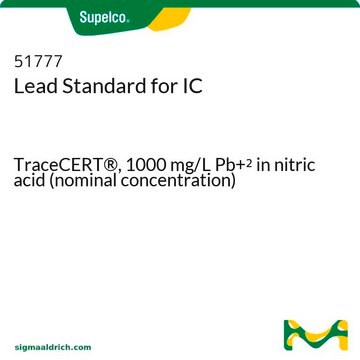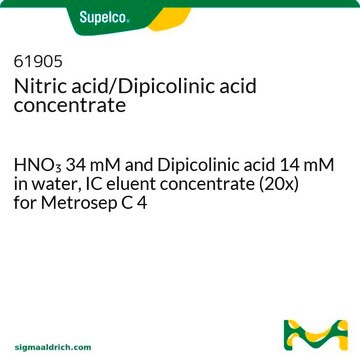8.00614
Pyridine-2,6-dicarboxylic acid
for synthesis
Synonym(s):
Pyridine-2,6-dicarboxylic acid, Dipicolinic acid
About This Item
Recommended Products
vapor pressure
<0.01 hPa ( 20 °C)
Quality Level
Assay
≥98.0% (acidimetric)
form
powder
autoignition temp.
620 °C
potency
10500 mg/kg LD50, oral (Rat)
pH
2.0 (20 °C, 5 g/L in H2O)
mp
248-255 °C
solubility
5 g/L
bulk density
700 kg/m3
storage temp.
2-30°C
InChI
1S/C7H5NO4/c9-6(10)4-2-1-3-5(8-4)7(11)12/h1-3H,(H,9,10)(H,11,12)
InChI key
WJJMNDUMQPNECX-UHFFFAOYSA-N
Related Categories
Application
- Adsorption of Cu(II) ions from aqueous solution using pyridine-2,6-dicarboxylic acid crosslinked chitosan as a green biopolymer adsorbent.: This research explores the efficiency of a green biopolymer, specifically chitosan crosslinked with pyridine-2,6-dicarboxylic acid, for the adsorption of copper ions from aqueous solutions, highlighting its potential for environmental cleanup and water treatment (Bisiriyu et al., 2020).
- Crystal structure of nonadentate tricompartmental ligand derived from pyridine-2,6-dicarboxylic acid: Spectroscopic, electrochemical and thermal investigations of its transition metal(II) complexes.: This article details the structural and functional characteristics of a complex ligand derived from pyridine-2,6-dicarboxylic acid, which could inform further research in coordination chemistry and material science (Vadavi et al., 2011).
- Pyridine-substituted oligopeptides as scaffolds for the assembly of multimetallic complexes: variation of chain length.: This research explores the use of pyridine-2,6-dicarboxylic acid in the construction of oligopeptide scaffolds for multimetallic complexes, relevant to the fields of molecular engineering and nanotechnology (Ohr et al., 2005).
- Comprehensive study of the luminescent properties and lifetimes of Eu(3+) and Tb(3+) chelated with various ligands in aqueous solutions: influence of the synergic agent, the surfactant and the energy level of the ligand triplet.: This study provides a thorough analysis of the luminescent behavior of lanthanide complexes with pyridine-2,6-dicarboxylic acid derivatives, significant for developing advanced photonic and electronic materials (Arnaud et al., 2003).
Analysis Note
Identity (IR): conforms
Signal Word
Danger
Hazard Statements
Precautionary Statements
Hazard Classifications
Eye Dam. 1 - Skin Corr. 1B - STOT SE 3
Target Organs
Respiratory system
Storage Class Code
8A - Combustible, corrosive hazardous materials
WGK
WGK 3
Flash Point(F)
370.4 °F - closed cup
Flash Point(C)
188 °C - closed cup
Certificates of Analysis (COA)
Search for Certificates of Analysis (COA) by entering the products Lot/Batch Number. Lot and Batch Numbers can be found on a product’s label following the words ‘Lot’ or ‘Batch’.
Already Own This Product?
Find documentation for the products that you have recently purchased in the Document Library.
Customers Also Viewed
Our team of scientists has experience in all areas of research including Life Science, Material Science, Chemical Synthesis, Chromatography, Analytical and many others.
Contact Technical Service















